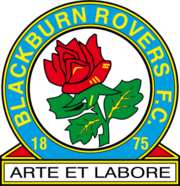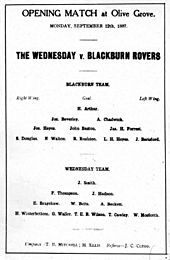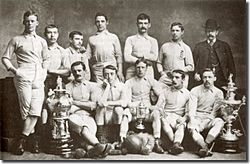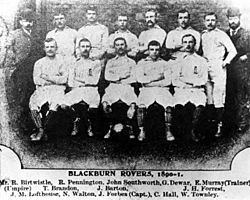Blackburn Rovers F.C. facts for kids
 |
|||
| Full name | Blackburn Rovers Football Club | ||
|---|---|---|---|
| Nickname(s) |
|
||
| Founded | 1875 | ||
| Ground | Ewood Park | ||
| Capacity | 31,367 | ||
| Owner | Venkys London Ltd. (99.9%) | ||
| COO | Suhail Pasha | ||
| Head coach | Valérien Ismaël | ||
| League | Championship | ||
| 2018–19 | Championship, 15th of 24 | ||
|
|||
Blackburn Rovers Football Club is a professional football team from Blackburn, Lancashire, England. They play in the Championship, which is the second-highest league in English football. Their home stadium, Ewood Park, has been their base since 1890. The club's motto is "Arte et Labore", which means "By Skill and Hard Work" in Latin. They have a big rivalry with nearby club Burnley, and their matches are called the East Lancashire derby.
Blackburn Rovers started in 1875. They were one of the first teams to form The Football League in 1888. In the 1800s, they won the FA Cup five times: in 1884, 1885, 1886, 1890, and 1891. They also became English League champions in 1911–12 and 1913–14. They won their sixth FA Cup in 1928.
The team was relegated (moved down a league) for the first time in 1936. They returned to the top league in 1938–39. After being relegated again in 1948, they got promoted in 1957–58. However, they were relegated in 1966 and again in 1971. Blackburn won the Third Division title in 1974–75. They were promoted again in 1979–80 after being relegated the year before. They won the Full Members' Cup in 1987.
In 1992, Rovers moved up to the new Premier League. This happened a year after local businessman Jack Walker bought the club and hired Kenny Dalglish as manager. In the 1994–95 season, Rovers became Premier League champions! They were relegated four seasons later but got promoted again in 2000–01. The next year, they won the 2002 Football League Cup Final. They stayed in the Premier League for eleven seasons but were relegated in 2012 and again to the third tier in 2017. Blackburn got promoted out of League One at the end of the 2017–18 season.
Contents
- Club History: How Blackburn Rovers Started
- The Very Beginning (1875-1888)
- Joining the Football League and More Wins (1888-1900s)
- Early 1900s: A Top Team
- Mid-20th Century: Ups and Downs
- 1970s and 1980s: Moving Between Divisions
- The 1990s: Premier League Champions!
- The 2000s: Back to the Premier League
- 2010 Onwards: New Owners and Recent Seasons
- Team Players
- Club Staff
- Awards and Records
- Team Colors and Badge
- Home Grounds
- Fans and Rivalries
- Club Achievements
- See also
Club History: How Blackburn Rovers Started
The Very Beginning (1875-1888)
Blackburn Rovers was formed after a meeting on November 5, 1875. Two young men, John Lewis and Arthur Constantine, organized it. They wanted to create a football club that played by "Association rules." The first match for Blackburn Rovers was on December 18, 1875, and it ended in a 1–1 draw.
In 1878, Blackburn Rovers helped create the Lancashire Football Association. On November 1, 1879, the club played in the FA Cup for the first time, winning 5–1.
In 1882, the club reached the FA Cup final for the first time. They were the first team from outside London to reach the final, but they lost 1–0.
Rovers finally won the FA Cup on March 29, 1884, beating a Scottish team called Queen's Park 2–1. They played Queen's Park again in the final the next year and won 2–0. Rovers won the FA Cup for a third time in a row the season after, beating West Bromwich Albion 2–0 in a replay. For winning three times in a row, they received a special silver shield.
In the 1885–86 season, professional footballers became legal. Blackburn Rovers spent £615 on player wages that season.
Joining the Football League and More Wins (1888-1900s)
Blackburn Rovers was one of the founding members of the Football League in 1888.
They reached the FA Cup final again in 1890 and won the trophy for the fourth time. They beat Sheffield Wednesday 6–1, with William Townley scoring three goals. This made him the first player to score a hat-trick in an FA Cup final.
In the 1890–91 season, Blackburn Rovers won the FA Cup for the fifth time, beating Notts County 3–1. In 1897–98, the club was relegated but was voted back into the top division. This season also marked the start of Bob Crompton's long connection with the club, first as a player and later as a manager who won the FA Cup.
Early 1900s: A Top Team
Blackburn Rovers had some tough years in the early 1900s, but their results slowly got better. They made big improvements to Ewood Park, their stadium. In the first 30 years of the 20th century, Blackburn Rovers were considered one of the best teams in England. They won the First Division championship in 1911–12 and 1913–14. They also won the FA Cup in 1927–28, beating Huddersfield Town 3–1. This FA Cup win was their last major trophy for almost 70 years.
Mid-20th Century: Ups and Downs
Blackburn Rovers stayed in a good mid-table position in the First Division until they were relegated in the 1935–36 season. This was their first time out of the top league since the Football League began.
After World War II, Blackburn Rovers were relegated again in 1947–48. They stayed in the second division for ten years. After getting promoted in 1958, they returned to a mid-table spot. They didn't often challenge for major trophies during this time. They did reach the 1960 FA Cup Final but lost 3–0 to Wolverhampton Wanderers.
There was a brief hope of success in the 1963–64 season when they won 8–2 against West Ham United on Boxing Day, which put them at the top of the league. However, their lead didn't last long, and they finished much lower down the table. They were relegated from the First Division in 1966 and stayed out of the top division for 26 years.
1970s and 1980s: Moving Between Divisions
In the 1970s, Blackburn Rovers moved between the Second and Third Divisions. They won the Third Division title in 1975 but couldn't get promoted to the First Division. They fell back into the Third Division in 1979. They were promoted as runners-up in the Third Division in 1980. Since then, except for one season in League One in 2017–18, they have stayed in the top two tiers of English football.
They almost got promoted again the next year, but they missed out by a small difference in goals. The manager, Howard Kendall, then moved to Everton. The next manager, Bobby Saxton, only managed mid-table finishes for three seasons. He almost achieved promotion in 1984–85, but a bad finish the next year and a terrible start to the 1986–87 season cost him his job.
Don Mackay took over and led them to a good finish that season, plus a win in the Full Members Cup. For the next three seasons, Mackay made Rovers strong contenders for promotion, but they just missed out each time. In 1988–89, they reached the Second Division play-off final but lost. More disappointment came in the 1989–90 play-off semi-finals. However, the next season, local steelworks owner and lifelong fan Jack Walker bought the club.
The 1990s: Premier League Champions!
After Jack Walker took over, Rovers finished 19th in the Second Division in 1990–91. But the new owner made millions of pounds available for new players. He hired Kenny Dalglish as manager in October 1991. Rovers earned promotion to the new FA Premier League at the end of the 1991–92 season by winning the play-offs. This ended their 26 years outside the top league.
Rovers made big news in 1992 by paying a record English fee of £3.5 million for 22-year-old England striker Alan Shearer. After finishing fourth in 1992–93 and second in 1993–94, they went on to win the Premier League title in 1994–95! The title race went down to the very last game of the season. Even though Rovers lost to Liverpool, they beat out rivals Manchester United to win the championship.
Kenny Dalglish moved to a Director of Football role after the Premier League win, and his assistant Ray Harford became manager. Blackburn Rovers had a tough start to the 1995–96 season and struggled in the Champions League.
A poor start to the 1996–97 Premier League season led to Harford resigning. The club was at the bottom of the league. Long-serving coach Tony Parkes took over and managed to keep the team from being relegated. That summer, Roy Hodgson became manager. Rovers finished 6th, which meant they qualified for the UEFA Cup. However, they had a bad start to the 1998–99 season, and Hodgson was sacked. Brian Kidd replaced him but couldn't save Rovers from relegation.
The 2000s: Back to the Premier League
In 1999–2000, Rovers were expected to be promoted, but they were close to the relegation zone in Division One. Brian Kidd was sacked, and Graeme Souness took over. Jack Walker passed away at the start of the 2000–01 season. The club dedicated their promotion efforts to him. They returned to the Premier League after a much better season, finishing second.
In 2001–02, they bought record signing Andy Cole for £8 million. Rovers won their first-ever League Cup by beating Tottenham Hotspur 2–1. Cole scored the winning goal. The next season, Rovers finished sixth, qualifying for the UEFA Cup again. Souness left in 2004 to manage Newcastle, and Mark Hughes became the new manager. Hughes helped Rovers stay in the Premier League and reach an FA Cup semi-final. He led the team to sixth place the next season, qualifying for Europe for the third time in five years.
Rovers reached the semi-final of the 2006–07 FA Cup but lost to Chelsea. They finished tenth in the league, qualifying for the Intertoto Cup, which led to a short run in the 2007–08 UEFA Cup. In May 2008, Mark Hughes left for Manchester City. Paul Ince replaced him. Ince's time started well, but after eleven games without a win, he was sacked. Sam Allardyce was appointed and led the team to a tenth-place finish and a League Cup semi-final in 2009–10.
2010 Onwards: New Owners and Recent Seasons
In November 2010, an Indian company called V H Group bought Blackburn Rovers for £23 million. The new owners immediately fired manager Sam Allardyce and replaced him with Steve Kean. Kean's appointment caused some debate.
On May 7, 2012, Blackburn was relegated to the Championship after losing to Wigan Athletic. This ended their eleven years in the Premier League. Kean resigned as manager in September 2012 due to pressure from fans.
On May 7, 2017, Blackburn was relegated to League One. However, on April 24, 2018, the club was promoted back to the second tier with a 1–0 win against Doncaster Rovers.
In recent years, they have finished 15th (2018–2019), 11th (2019–2020), 15th (2020–2021), 8th (2021–2022), and 7th (2022–2023) in the Championship. In the 2023–2024 season, Blackburn just avoided relegation on the last day, finishing 19th after a 2–0 win against Leicester City.
Team Players
Current Squad
|
|
Players on Loan
|
|
For recent player changes, see 2025–26 Blackburn Rovers F.C. season.
Famous Players
For a full list of famous Blackburn Rovers players, see List of Blackburn Rovers F.C. players.
Club Staff
Main Management Team
| Position | Staff |
|---|---|
| Chief Operating Officer | Suhail Pasha Shaikh |
| Chief Financial Officer | Matt Wright |
| Director | Gandhi Babu |
| Director | Mr. M Sreenivasa Rao |
| Non-Executive Director | Robert Coar |
Football Staff
Academy Staff
| Position | Staff |
|---|---|
| Academy Manager | Paul Gray |
| Under-21s Lead Coach | Mike Sheron |
| Under-21s Assistant Coach | Paul Butler |
| Under-18s Lead Coach | Darragh Tuffy |
| Head of Academy Sports Science and Medical | Rob Pulling |
| Head of Academy Recruitment | Michael Cribley |
| Academy Secretary | Dawn Dunn |
Club Operations Staff
| Position | Staff |
|---|---|
| Head of Football Administration | Brett Baker |
| Head of Operations | Lynsey Talbot |
| Head of HR & Safeguarding | Faye Billington |
| Head of IT | Kieran Shellard |
| Head of Media & Communications | Rob Gill |
| Head of Commercial & Partnerships | Yasir Sufi |
| Head of Marketing | Anna Melia
Fb cs staff |bg= |p=Head of Community Trust/CEO |s= Gary Robinson }} |
Awards and Records
Player of the Season Awards
|
|
|
|
Club Records
- Most League games played: Derek Fazackerley, 593 games from 1970–71 to 1986–87.
- Record goalscorer: Simon Garner, 194 goals (168 in the league) from 1978–79 to 1991–92.
- Highest attendance at Ewood Park: 62,255 fans against Bolton Wanderers in the FA Cup on March 2, 1929.
- Most expensive player bought: £8 million for Andy Cole in December 2001 and for Jordan Rhodes in August 2012.
- Most expensive player sold: Up to £22 million for Adam Wharton in February 2024.
- Biggest win: 11–0 against Rossendale United in the FA Cup on October 13, 1884.
- Biggest League win: 9–0 against Middlesbrough on November 6, 1954.
- Biggest away win: 8–2 against West Ham United on December 26, 1963.
- Longest undefeated FA Cup run: 24 games, including 3 FA Cup wins in a row (1884–86). This is still an FA Cup record!
Team Colors and Badge
Team Colors
Blackburn Rovers has almost always used the same home kit design: a blue and white halved jersey. This design is known as the "town color." While the design has stayed the same, the sides where the blue and white appear have changed over time. Since 1946, blue has been on the left side of the shirt.
The club's very first kit is not fully clear. Some say it was a white jersey with a Maltese Cross. Others say it was a navy blue and white quartered jersey. Photos from 1878 show the team in blue and white halved jerseys, white shorts, and blue socks, with a blue and white cap and a Maltese Cross.
Club Badge
Throughout its history, the club has used four main badges: the Maltese Cross, the town's coat of arms, the Lancashire Rose, and the current Blackburn Rovers Badge.
The Maltese Cross was on the club's first home kit from 1875 to about 1882. This cross was linked to the schools where the club's founders studied.
For FA Cup finals, the club traditionally used the town's coat of arms as their badge. This tradition continued through all eight FA Cup finals they played in, up to their last one in 1960.
From about 1882 until 1974, the club didn't use a badge on their shirts, except for cup finals. In 1974, they chose an embroidered Lancashire Rose with the club's initials "B.R.F.C." below it. This badge was used for 15 years until 1989.
The current Blackburn Rovers badge has been used since 1989. It features a newer design of the Lancashire Red Rose. Around the rose, it says "Blackburn Rovers F.C." and the founding year "1875." At the bottom of the badge is the club motto, "Arte Et Labore," which means "by skill and by labour." This motto comes from the town's motto, adopted in 1852.
Home Grounds
Early Grounds (1875-1890)
Rovers' first home ground was a field called Oozehead from 1875 to 1877. It was farmland, and cows grazed there when the team wasn't playing. There was a large watering hole in the middle of the field that had to be covered for matches.
Because of the rough conditions at Oozehead, the club used Pleasington Cricket Ground in 1877. They then moved to Alexandra Meadows, another cricket ground, from 1877 to 1881. It was here that Blackburn Rovers played their first match under artificial light in 1878.
In 1881, the club moved to Leamington Road, their first purpose-built football ground. It had a grandstand that could seat 700 people. The first game there was on October 8, 1881. While at Leamington Road, the club won three FA Cups and became a founding member of the Football League in 1888. They left this ground because the rent became too expensive.
Ewood Park: Home Since 1890
Blackburn Rovers moved to Ewood Park in 1890, and it has been their home ever since. The ground was originally built in 1882 and hosted different sports. The first game at the new Ewood Park was on September 13, 1890, a 0–0 draw watched by 10,000 people. Artificial lights were installed in 1892. Ewood Park is located by the River Darwen in Blackburn, Lancashire.
A Historical Incident at Ewood Park
In 1913, there was an attempt to damage the ground. As part of a campaign for women's right to vote, some activists tried to burn down Ewood Park's grandstand. They were stopped, but in the same year, similar attempts happened at other football grounds. This was done to protest against male dominance in society.
Fans and Rivalries
Blackburn Rovers fans have created several support clubs to make it easier to travel to games at Ewood Park. In the 2000s, Rovers' home games were very well attended, with an average of about 25,000 fans. This was roughly a quarter of Blackburn's population. The supporters have a long-running fan magazine called 4,000 Holes.
Clement Charnock and his brother Harry, who were Blackburn Rovers fans, helped introduce football to Russia in the 1880s.
Blackburn's main rivals are Burnley. Their matches are known as the East Lancashire derby. Rovers also have rivalries with Preston North End, Bolton Wanderers, and Wigan Athletic, all teams from the North-West of England.
Club Achievements
Source:
League Titles
- First Division / Premier League (Top League)
- Champions: 1911–12, 1913–14, 1994–95
- Second Place: 1993–94
- Second Division / First Division / Championship (Second League)
- Champions: 1938–39
- Second Place: 1957–58, 2000–01
- Play-off Winners: 1992
- Third Division / League One (Third League)
- Champions: 1974–75
- Second Place: 1979–80, 2017–18
Cup Wins
- FA Cup
- Winners (6): 1883–84, 1884–85, 1885–86, 1889–90, 1890–91, 1927–28
- Runners-up: 1881–82, 1959–60
- Football League Cup
- Winners: 2001–02
- FA Charity Shield
- Winners: 1912
- Runners-up: 1928, 1994, 1995
- Full Members' Cup
- Winners: 1986–87
- Football League War Cup
- Runners-up: 1939–40
Regional Cups
- Lancashire Cup
- Winners (20): 1881–82, 1882–83, 1883–84, 1884–85, 1895–96, 1900–01, 1901–02, 1903–04, 1906–07, 1908–09, 1910–11, 1944–45, 1983–84, 1985–86, 1987–88, 1989–90, 2006–07, 2010–11, 2018–19, 2020–21
See also
 In Spanish: Blackburn Rovers Football Club para niños
In Spanish: Blackburn Rovers Football Club para niños
 | Delilah Pierce |
 | Gordon Parks |
 | Augusta Savage |
 | Charles Ethan Porter |





